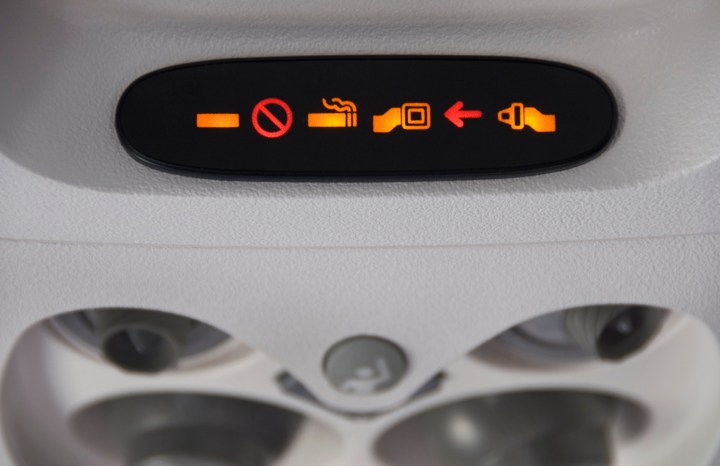
Why do airplanes have ashtrays on board if smoking is banned?
Share Now on:
Why do airplanes have ashtrays on board if smoking is banned?

This is just one of the stories from our “I’ve Always Wondered” series, where we tackle all of your questions about the world of business, no matter how big or small. Ever wondered if recycling is worth it? Or how store brands stack up against name brands? Check out more from the series here.
Listener Nathan Taylor from Philadelphia asks:
Why do airplanes have no smoking signs, but still have ashtrays in the lavatories?
Whenever you board an airplane, you’ll be reminded not to smoke through written signs on the aircraft or illuminated signs noting that cigarettes are banned.
Even though smoking is completely banned on U.S. flights, airplanes are required by the Federal Aviation Administration to have ashtrays on or near the lavatory door for the very simple reason that some people still try to smoke on board.
“The installation of an ashtray on or near the lavatory door will ensure that uninformed persons who find themselves with lighted smoking materials on the airplane will have an obvious location to dispose of smoking materials before entering the lavatory,” the FAA says.
An airline cabin crew member, whose name we’re withholding for privacy reasons, told Marketplace that it’s safer to snuff out a cigarette in the ashtray than in a trash bin that may have other combustibles.
The airline employee, who works in Europe and previously worked for a major U.S. airline, said she’s caught people smoking over the years.
“What people don’t understand is that a fire on board is one of the most scary things to have,” said the employee who, has experience dealing with fires outside airplanes; prior to entering the airline industry, she actually worked as a firefighter for more than two decades.
The FAA keeps track of reports involving “unruly passengers,” which include people who smoke on board. The agency does not have the power to file criminal charges, according to the Associated Press, which is why it’ll sometimes ask the FBI to review these cases for criminal prosecution.
Back in 2021, the FAA said it was proposing a fine of $16,700 against a passenger on an Allegiant Air flight “for allegedly smoking in the lavatory.” The FAA added that in another flight a few days later, this passenger also “allegedly physically and verbally assaulted other passengers, and shouted obscenities at the crew members.”
The FAA’s website states that the agency “can propose civil penalties up to $37,000 per violation” when it comes to cases involving unruly passengers.
Smoking on all domestic and foreign flights to or from the U.S. was banned under a 2000 law signed by Bill Clinton, said S. V. (Steve) Dedmon, a professor and the associate chair of the aeronautical science department at Embry-Riddle Aeronautical University.
This law was the culmination of several other efforts to limit smoking on board.
Airlines were required to separate smokers from nonsmoking passengers in 1973. Later that decade, most airlines banned cigar and pipe smoking following rulings from the Civil Aeronautics Board, a federal agency that was abolished in 1985.
Dedmon said that in 1988, President Ronald Reagan signed a law that banned smoking on all domestic flights that were two hours or less. This was expanded to flights that were six hours or less under a law signed by George H. W. Bush in 1990.
Correction (Feb. 26, 2024): A previous version of this story misspelled S. V. (Steve) Dedmon’s name.
There’s a lot happening in the world. Through it all, Marketplace is here for you.
You rely on Marketplace to break down the world’s events and tell you how it affects you in a fact-based, approachable way. We rely on your financial support to keep making that possible.
Your donation today powers the independent journalism that you rely on. For just $5/month, you can help sustain Marketplace so we can keep reporting on the things that matter to you.


















